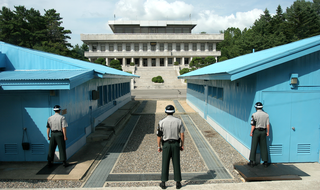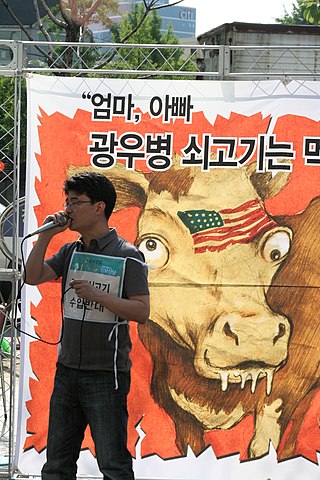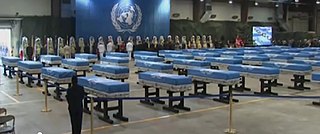| |||||
| Centuries: | |||||
|---|---|---|---|---|---|
| Decades: | |||||
| See also: | Other events of 2015 Years in South Korea Timeline of Korean history 2015 in North Korea | ||||
The following lists events that happened in 2015 in South Korea .
| |||||
| Centuries: | |||||
|---|---|---|---|---|---|
| Decades: | |||||
| See also: | Other events of 2015 Years in South Korea Timeline of Korean history 2015 in North Korea | ||||
The following lists events that happened in 2015 in South Korea .

The Korean War was an armed conflict on the Korean Peninsula fought between North Korea and South Korea and their allies. North Korea was supported by the People's Republic of China and the Soviet Union, while South Korea was supported by the United Nations Command (UNC) led by the United States. The conflict was the first major proxy war of the Cold War. Fighting ended in 1953 with an armistice but no peace treaty, leading to the ongoing Korean conflict.

North Korea, officially the Democratic People's Republic of Korea (DPRK), is a country in East Asia. It constitutes the northern half of the Korean Peninsula and borders China and Russia to the north at the Yalu (Amnok) and Tumen rivers, and South Korea to the south at the Korean Demilitarized Zone. The country's western border is formed by the Yellow Sea, while its eastern border is defined by the Sea of Japan. North Korea, like its southern counterpart, claims to be the sole legitimate government of the entire peninsula and adjacent islands. Pyongyang is the capital and largest city.

Missing in action (MIA) is a casualty classification assigned to combatants, military chaplains, combat medics, and prisoners of war who are reported missing during wartime or ceasefire. They may have been killed, wounded, captured, executed, or deserted. If deceased, neither their remains nor grave have been positively identified. Becoming MIA has been an occupational risk for as long as there has been warfare.

Paju is a city in Gyeonggi Province, South Korea. Paju was made a city in 1997; it had previously been a county (gun).

The Joint Security Area is the only portion of the Korean Demilitarized Zone (DMZ) where North and South Korean forces stand face-to-face. The JSA is used by the two Koreas for diplomatic engagements and, until March 1991, was also the site of military negotiations between North Korea and the United Nations Command (UNC).

The Korean diaspora consists of around 7.3 million people, both descendants of early emigrants from the Korean Peninsula, as well as more recent emigrants from Korea. Around 84.5% of overseas Koreans live in just five countries: the United States, China, Japan, Canada, and Uzbekistan. Other countries with greater than 0.5% Korean minorities include Brazil, Russia, Kazakhstan, Vietnam, the Philippines, and Indonesia. All of these figures include both permanent and temporary migrants.
People defect from North Korea for political, material, and personal reasons. Defectors flee to various countries, mainly South Korea. In South Korea, they are referred to by several terms, including "northern refugees" and "new settlers".

Diplomatic relations between South Korea and the United States commenced in 1949. The United States helped establish the modern state of South Korea, officially the Republic of Korea, and fought on its UN-sponsored side in the Korean War (1950–1953). During the subsequent decades, South Korea experienced tremendous economic, political and military growth.

Anti-American sentiment in Korea began with the earliest contact between the two nations and continued after the division of Korea and Korean War. Despite this, as of 2011, 74% of South Koreans have a favorable view of the U.S., making it one of the most pro-American countries in the world.

Mark William Lippert is an American diplomat who worked as the vice president for international affairs at Boeing from 2017 to 2020. In 2022, he was appointed Executive Vice President of Samsung Electronics America. He previously served as the United States Ambassador to South Korea from 2014 to 2017. Prior to his tour as an ambassador, Lippert had served as Chief of Staff for Secretary of Defense Chuck Hagel, Chief of Staff for the National Security Council, and Assistant Secretary of Defense for Asian and Pacific Security Affairs in the Department of Defense. On March 5, 2015, he was attacked by a man wielding a knife in South Korea.

The Korean Armistice Agreement is an armistice that brought about a cessation of hostilities of the Korean War. It was signed by United States Army Lieutenant General William Harrison Jr. and General Mark W. Clark representing the United Nations Command (UNC), North Korea leader Kim Il Sung and General Nam Il representing the Korean People's Army (KPA), and Peng Dehuai representing the Chinese People's Volunteer Army (PVA). The armistice was signed on 27 July 1953, and was designed to "ensure a complete cessation of hostilities and of all acts of armed force in Korea until a final peaceful settlement is achieved."
Korea has always been a highly ethnically and linguistically homogeneous nation, however some minorities in Korea exist. Since recent decades, South Korea has become home to a number of foreign residents (4.9%), whereas isolated North Korea has not experienced this trend.

The United Nations Memorial Cemetery in Korea, located at Tanggok in the Nam District, of Busan, South Korea, is a burial ground for United Nations Command (UNC) casualties of the Korean War. It contains 2,300 graves and is the only United Nations cemetery in the world. Laid out over 14 hectares, the graves are set out in 22 sites designated by the nationalities of the buried servicemembers.
Events in the year 2014 in China.
Events in the year 2014 in South Korea.

Military Cemetery for North Korean Soldiers located in Jajang-Ro, Papyeong-myeon (파평면), Paju, South Korea, is a burial ground for North Korean casualties of the Korean War and North Korean agents killed in South Korea since the end of the war. The cemetery formerly contained the remains of 541 Chinese People's Volunteer Army soldiers but these were all repatriated between March 2014 and March 2016.

After the Korean War, 333 South Korean people detained in North Korea as prisoners of war chose to stay in North Korea. During subsequent decades of the Cold War, some people of South Korean origin defected to North Korea as well. They include Roy Chung, a former U.S. Army soldier who defected to North Korea through East Germany in 1979. Aside from defection, North Korea has been accused of abduction in the disappearances of some South Koreans.

Terrorism and tourism in Egypt is when terrorist attacks are specifically aimed at Egypt's tourists. These attacks often end in fatalities and injuries and have an immediate and sometimes lasting effect on the industry. Attacks take many forms; blowing up an airplane carrying tourists, drive-by shootings of tourists, knife attacks on tourists and suicide bombings in a location where tourists are congregated. On the timeline of these events, the 1997 Luxor Massacre stands out as the worst in the history of attacks on tourists in Egypt.

The recovery of US human remains from the Korean War has continued since the end of the war.